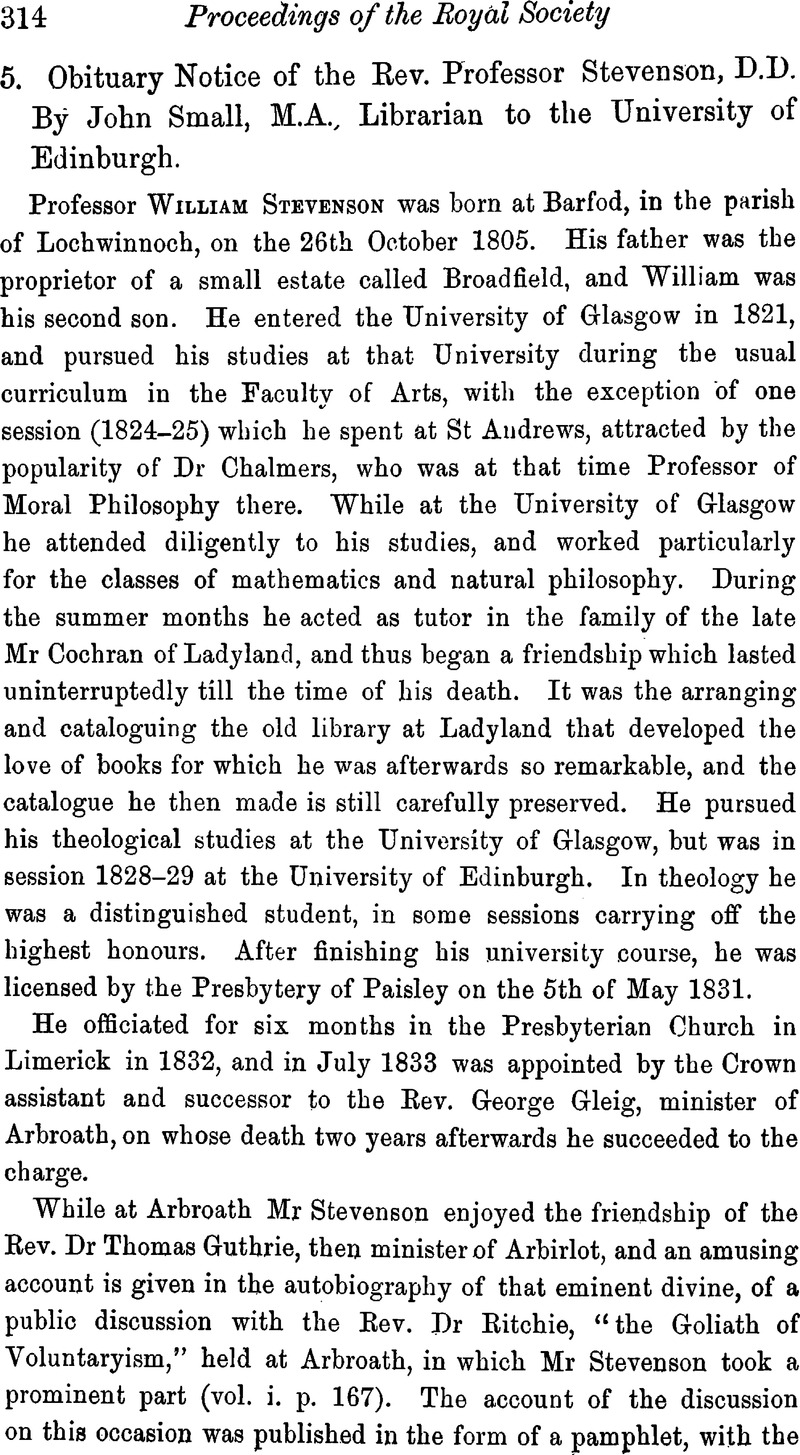No CrossRef data available.
Article contents
5. Obituary Notice of the Rev. Professor Stevenson, D.D.
Published online by Cambridge University Press: 15 September 2014
Abstract

- Type
- Proceedings 1873-74
- Information
- Copyright
- Copyright © Royal Society of Edinburgh 1875
References
page 316 note * One of these, arranged in honour of Dr Reeves, of Trinity College, Dublin, was to inspect the curious buildings still existing at Culross, and Sir James had chartered a steamer to take a large party from Leith to visit that ancient Burgh. So much time, however, had been lost in visiting Inch Garvie and other islets in the Firth, that on reaching Culross, from the shallowness of the wator, the steamer had to anchor a long way from the shore. Nothing daunted, Sir James, with a dozen of followers, got into a small boat, but it at last ran aground. The rest of the party getting into another boat, and avoiding the error the first had committed, reached the pier by a circuitous route, and lent their aid to bring the party which had first left the steamer ashore. They were at last carried through the shallow water and mud on the shoulders of the Culross boatmen, and the appearance of Sir James himself as he was supported on the backs of two sailors, with other two lending their assistance, created great merriment. This was often referred to by Dr Stevenson as one of his happiest excursions. Although differing in Church politics, a great friendship existed between Sir James and Dr Stevenson, and on the death of the former Dr Stevenson was much affected. He expressed his feelings in a poem, a portion of which was inserted in the Life of Sir James by the Rev. Dr Duns.
page 318 note * The allusion by Sir Alexander Grant to Dr Stevenson was in the following terms:—“I regret now to have to announce the retirement, owing to impaired health, of Dr Stevenson, who for eleven years has occupied the important Chair of Divinity and Ecclesiastical History. During that time Professor Stevenson has shown himself to be a man of real learning; he has exhibited that quality which the philosopher Coleridge used to value highly, and which he called ‘book-mindedness.’ In an age distracted by a number of ephemeral interests, and, at the same time vaunting itself on a Baconian adhesion to things rather than to words, this quality of ‘book-mindedness,’ the characteristic of the scholar of the olden times, has a tendency to become rare. But, for the interests of humanity, it is necessary that there should be not only men who study nature, but also men whose life is spent in books—whose minds are more taken up with the past than the present; to whom everything suggests an association with some great writer, and who thus serve as the living interpreters of libraries, and as links to maintain the hereditary succession of thought. Such a man as this is our friend Professor Stevenson, and such a character as his is the appropriate ornament of Universities. He has ever manifested not only the learning, but also the urbanity, of the true scholar; and in quitting the labours of the class-room and the Senate-hall to seek that repose which has now become necessary to him, he will not leave a single enemy behind. He will take with him into privacy the regrets of his colleagues, and their sincere wishes that he may yet enjoy many years of happiness and peace.”


